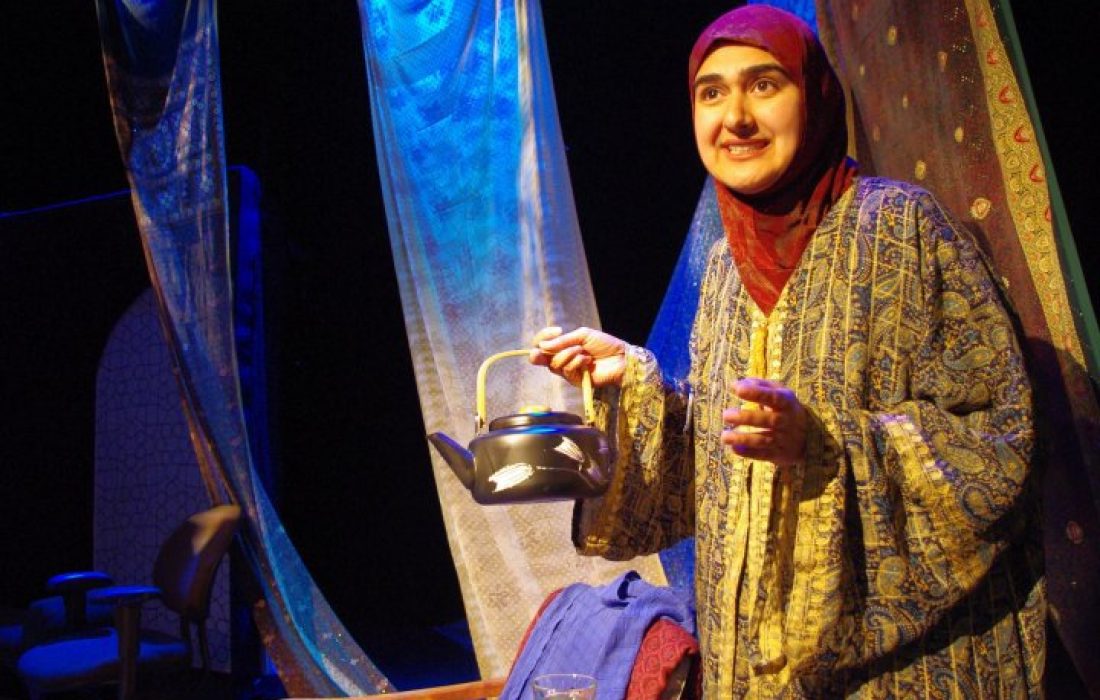Rohina Malik’s one-woman play “Unveiled” is an extremely powerful exploration of Islamophobia and racism post-9/11 and the power of hope.
Review: Rohina Malik ‘Unveiled’ Evocative Storytelling and Acting at Newhart Theatre
Content warning: Islamophobia, racism
Four women with four distinct stories of shared adversity and hope — all played by one woman.
“Unveiled: A One Woman Play” by Rohina Malik explores the stories of different women in their preference to wear the hijab and their experiences living in a post-9/11 world.
Told through vignettes with musical interludes from Lucia Thomas, Malik turned Newhart Theater into a one-on-one conversation through a continuous monologue. Referencing a different type of tea across each story, thematic beverages offered before and after each showing added to the show’s immersive nature.
Each of the four women’s stories follow alternating patterns of flashback and present but are distinct through Malik’s presentation.
In the first segment, seamstress Maryam — a Pakistani immigrant to the U.S. — told the story of her best friend’s wedding. The viewer took the place of a customer while Maryam explained that, while walking into the wedding venue, she was accosted and told to remove her hijab because she’s in America.
Working with a modest set of two chairs and three rugs, Malik smoothly drew into the flashback, engaging the audience while creating tangible illusions to a year in the past. After a near-violent confrontation with a man outside the wedding venue, Maryam spends the rest of the wedding at the local police station. Opening the play with a sobering moment of Islamophobia drew attention immediately to the theme of resilience.
Throughout the second woman’s story, Moroccan mint tea lingered in the background. The inclusion of the tea was only referenced at the beginning and the end, which made its placement feel unnecessary.
Noor, a Moroccan-American lawyer, helped her client be comfortable giving testimony in court. Previously, in a similar situation during her college years, Noor recalled the story of her fiance’s path to Islam through an orange peel. Noor had to find her own voice for court moments after his murder. In telling this story, Malik superbly uses romantic plot points to draw on the observer’s empathy.
Musical interludes provided by Thomas offered brief moments of decompression between the darker, lamentable narratives. In the post-show discussion held directly after the event, Thomas said she included songs either from the regions where the women are from or based on the story’s content.
While talking to a journalist for an unnamed outlet, the third woman, Shabana, reflects on the media’s misrepresentation and vilification of Islamic culture. Because the hijab is a visual representation of her religion, her mother warns her against wearing it, leading to arguments in her house.
Shabana’s main argument for wearing the hijab is that she wears it for God and herself. A powerful comparison to a nun’s habit intentionally opened the question — who gets to wear a veil and for which God?
In the final segment, Layla recounted the story of her brother’s death during 9/11 due to his attempt to help people survive the collapsing towers. Malik, in this narration, is at her most powerful through terse dialogue. Layla was spit on by a malicious protester outside her children’s school attached to a mosque in a Chicago suburb. Malik’s stage presence turned the viewer into the person spewing Islamophobic remarks.
Looking out into the audience, Layla stopped a police officer from arresting the protester and asked them to “remove the veil from your heart.”
Malik’s fluctuations between the dark and light combined with her evocative acting created a lingering pall of emotions with hope at the forefront.
Featured image courtesy of Rohina Malik
Topics
Get the Loyola Phoenix newsletter straight to your inbox!



